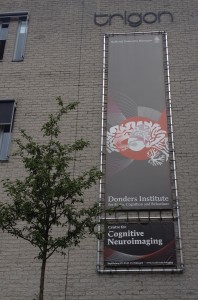The 2015 summer school at the Donders Institute at Radboud University in Nijmegen (Netherlands), running from 10th to 14th August, was the first summer school I had been to, and I thoroughly enjoyed the experience. The signature red Radboud University hoodie we received on the first day was an added bonus!
What prompted me to attend this particular summer school? My work at the Center for Cognitive and Decision Sciences focuses primarily on trying to understand risk taking, specifically how the brain deals with tasks that require people to decide whether to take a risk or not, and also whether there are structural differences between individuals which are associated with more or less risk taking. When we are looking at the relationship between brain function or structure and risk taking, rather than simply looking at the relationship with performance-based scores, it might be more informative to try to relate individual differences in cognitive processes evoked by a task with neural variation. Why? Since the brain carries out many different computations before an action (decision) is motivated, if we can understand the latent processes elicited by a task we might be one step closer to understanding ‚how the brain does it’.
The main aim of the summer school was to give students and early career researchers the necessary knowledge, awareness and tools to do exactly that: formulate ideas about how individuals process a given task or stimulus, specify a model that captures the hypothesised computations through model parameters, and finally check how well the model accounts for observed outcomes (e.g. decisions). The model parameters in turn can be fed into analyses of neuroimaging data, for example identifying structural and/or function correlates of these very same parameters.
In the mornings, lectures and seminars by high profile researchers (e.g. Klaas Enno Stephan, Alan Sanfey, Jeffrey Schall, Hanneke den Ouden, Daeyeol Lee, Bahador Bahrami, to name but a few … ) provided the necessary background, awareness and scope for application, which we could then put into practice during afternoon workshops in the computer lab. The entire week was very well organised and will hopefully lead to some interesting research directions in the future. I heard some highly inspiring talks, met other PhD students from around the world, got to present our work in poster form and discussed our work with other researchers working on similar questions.
If you are interested in these issues, I would highly recommend that you immerse yourself in the world of social, cognitive, affective and perceptual neuroscience and attend a summer school, such as the one at the Donders Institute.

Be the first to leave a comment. Don’t be shy.